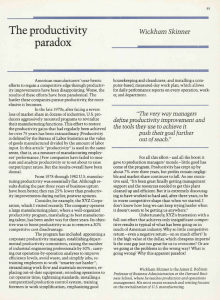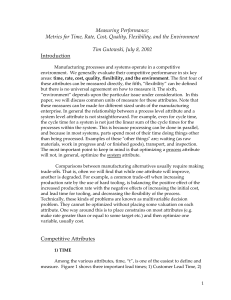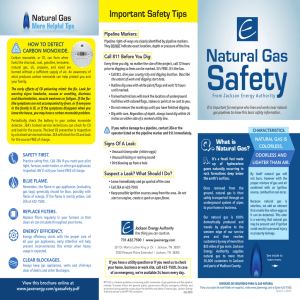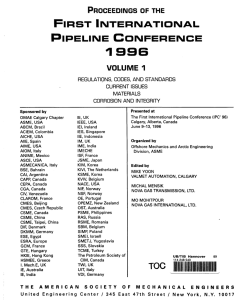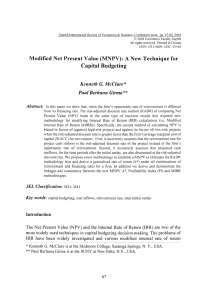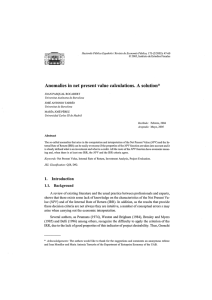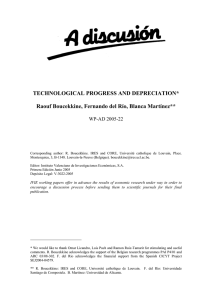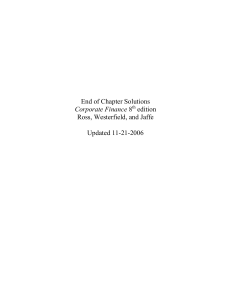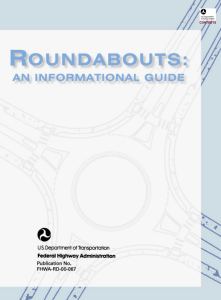Mersyside factory
Anuncio
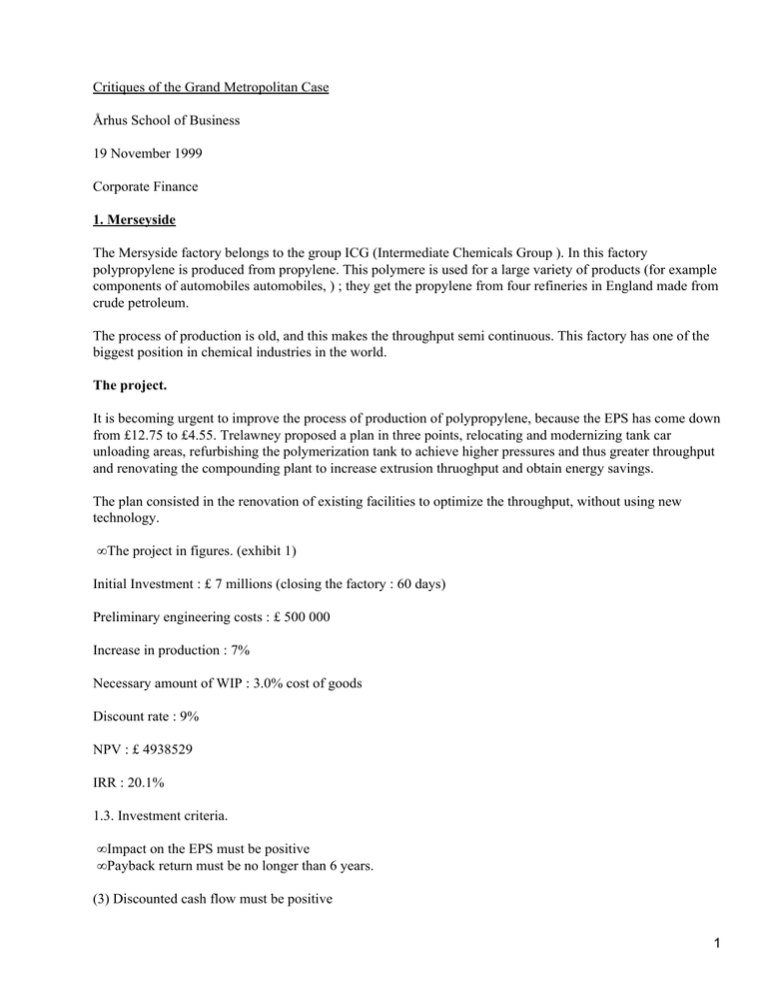
Critiques of the Grand Metropolitan Case Århus School of Business 19 November 1999 Corporate Finance 1. Merseyside The Mersyside factory belongs to the group ICG (Intermediate Chemicals Group ). In this factory polypropylene is produced from propylene. This polymere is used for a large variety of products (for example components of automobiles automobiles, ) ; they get the propylene from four refineries in England made from crude petroleum. The process of production is old, and this makes the throughput semi continuous. This factory has one of the biggest position in chemical industries in the world. The project. It is becoming urgent to improve the process of production of polypropylene, because the EPS has come down from £12.75 to £4.55. Trelawney proposed a plan in three points, relocating and modernizing tank car unloading areas, refurbishing the polymerization tank to achieve higher pressures and thus greater throughput and renovating the compounding plant to increase extrusion thruoghput and obtain energy savings. The plan consisted in the renovation of existing facilities to optimize the throughput, without using new technology. • The project in figures. (exhibit 1) Initial Investment : £ 7 millions (closing the factory : 60 days) Preliminary engineering costs : £ 500 000 Increase in production : 7% Necessary amount of WIP : 3.0% cost of goods Discount rate : 9% NPV : £ 4938529 IRR : 20.1% 1.3. Investment criteria. • Impact on the EPS must be positive • Payback return must be no longer than 6 years. (3) Discounted cash flow must be positive 1 (4) Internal rate of return must be greater than the discount rate used (9%) B. Rotterdam The factory at Rotterdam had the same cost and process structure. This factory with the one at Merseyside creates the group EC (Empirical Chemicals). The project. The proposed project for Rotterdam consisted of the conversion of the polymerization line of the factory into a sofisticated control process for the elaboration of the polymere. The continuous flow of materials would be assured by a pipeline. The factory had acquired the option to buy the pipeline and the land at a price of £ 3 millions, and currently the price is supposed to be worth £ 6 millions, which means an overvalue of 3 millions in comparison with the price payed (estimations in 15 years ahead give a price of £35 millions). • The project in figures (exhibit 4) Initial investment : £ 7.5 millions 3 millions now, 2 millions at the end of 1992, and 1.5 million in 1993, and finally 1 million in 1994 Preliminary engineering costs : £ 500 000 (sunc costs) Increase in production/Prior year : 2% per year Discount rate : 9% NPV : £ 2458392 IRR : 10.76% • Investment criteria. The conditions expected to be achieved are exactly the same than for A. • Comparison of the two projects. • Different criteria. • From the point of view of the recalculated NPV (the most important criteria) the project in Merseyside is better. (2) As far as the EPS is concerned.... (3) According to the payback period it is better the Merseyside project because it is of 4.36 years whereas in Rotterdam project is approximately 12 years. (Exhibit 8) (4) Because of the different outlays overtime we can´t compare the IRR. • From a strategic point of view. This is a comparative table of the two factories. 2 Merseyside Rotterdam Lost output in both factories. 60 days 5+4+3=12=365 days Since the two factories work at almost the highest capacity during the stop in production many customers will probably go to the competitors and this will cause a damage to the group. 1% in the first five years, 0.5% Energy savings during the next five and 0% in the Nothing next ones Double declining depreciation during the first ten years and Depreciation (exhibit 2 & 5) Exactly the same straight line depreciation during the next five Opportunity of acquiring new EPC and german technology in five Japanese computer assisted process. technologyy (exhibit 3) years The project at Merseyside has the advantage that has the possibility to carry out the german project in some years. On the other hand the project at Rotterdam will allow the enterprise to take a leadership in the market because it would have an earlier experience according to the learning curve than their competitors.Therefore if the german technology is effective, and also the company has the financial means, EC would then be able to invest in the new technology in the factory at Merseyside. Finally the project at Rotterdam doesn´t offer the flexibility of being able to change the technology without too high costs. Note : the new technology in one of the two factories will cause a smaller productivity in the other one and therefore a fall in the revenues of the other one. (This is explained by the fact that some customers from Merseyside will go to Rotterdam and viceversa ) (Exhibit 6) The project depends to a large Larger in the short run but the cash extent on the chance of selling the Risk of the projects (exhibit 7) flows are more certain pipelines at a price of £ 35 million Needless to say that in relation to the value of the pipeline in 15 years, a decrease in this value would cause a decrease in the NPV, and viceversa.(inflation, deflation...) Besides, accepting the Merseyside project means that it is possible to sell the pipeline and therefore generate a supplementary profit. If exercises the option and selling it Possibility of selling the pipeline at Excepcional gains (exihibit 3) right−away this would be an a price of £ 6 million or even more expensive if later... opportunity gain. Assumptions In the english project, we don´t take into consideration the supplementary costs generated by the charge of the transport costs assumed currently by the Transport Division. Anyway the costs of the accelerating the purchase of new trucks (2 million) is only the marginal cost of doing it in 1994 instead of 1996. The concesion of the pipeline is not a sure figure of £ 35 millions, and thus can change its value or become simply unsellable or unuseful. Makes project B very sensitive for changes in the market. In our opinion, there are mistakes in the calculations in these several points : 3 In addition, preliminary engineering costs shouldn´t be considered in the calculations of the NPV. We assume that they are part of a previous study and therefore should be considered as sunc costs. As far as depreciation is concerned we think it is not a good idea to make a double declining depreciation and a straight line one in one of the cases but not in the other one. Coherence should be showed to have comparable results in both cases. We consider that the discount rate that should be used in both cases is the 9% discount rate due to the fact that all the figures have been obtained in real terms, already considering inflation. For the calculations of the growth of the gross margin we found mistakes because every figure is obtained by multiplying twice by the discount factor, instead of just once. For the gross margin itself, we assume the calculations are OK, and that the energy savings are included in the calculations in A. Results of the calculations of the overhead costs are wrong in case B. Conclusion They should take the Merseyside project because it gives them an improvement in the production process with the flexibility to even improve it to a larger extent in 5 years. In our opinion, taking the Rotterdam project is too risky because they are relying too much on the value of the pipeline in 15 years, and there are many conditions that can change in 15 years, including prices, types of energies,etc. Annexe 1 1991 1992 1993 1994 1995 1996 1997 1998 4
